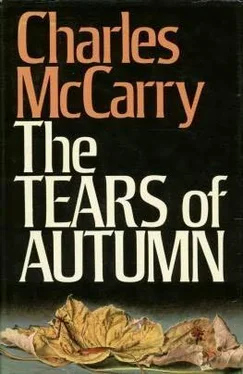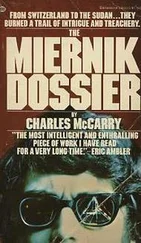Christopher slept on the train, protected by three nuns and a schoolboy who shared his compartment. In Bologna he leaned from the window and bought a sandwich and a bottle of beer from a platform vendor. One of the nuns peeled an orange and handed it to him, with the skin arranged around the fruit like the pointed leaves of a lily. She was young, with a sensual face from which prayer had scrubbed all traces of desire. However, the pretty orange, handed across the compartment as if she were feeding a horse and was wary of its teeth, was as much a gift of flirtation as of charity.
When Christopher arrived in midafternoon, Milan was bathed by the nickled light of the winter sun. He stayed long enough to buy two hundred feet of nylon climbing rope, a dozen pitons and a mountaineering hammer, a good camera with a closeup lens, and a small, powerful floodlamp bulb. Then he collected the car from Hertz, making certain that the trunk contained a set of tire chains.
There was little traffic on Route E-9, the road to Switzerland. The car was pushed toward the edge of the road by gusts of wind, and in Como the water of the lake blew over the jetties. At the Swiss frontier, Christopher was required by the relaxed police to show nothing but the green insurance card for his hired automobile. He inquired at Bellinzona, where the road forked, about the condition of the passes, and was advised to cross the Alps through the Splügen pass, since the higher Saint Gotthard and the Furka were closed.
There had been a heavy snowfall in the mountains, and he pulled off the road and attached the chains. It took him a long time to maneuver among the cars that had lost traction on the switchback road leading to the summit. At the top he got behind a Swiss postal bus, equipped with a snowplow and a sander, and followed it down the other side of the mountains into the valley of the Rhine.
It was ten o’clock when he reached Zurich. He drove through the dim streets, past the leaden Swiss architecture, until he found the hotel he was looking for. It stood in the Talstrasse, in a block whose rooftops led into the Bleicherweg.
After he had looked up Dieter Dimpel’s address in the telephone book, he walked along the street until he reached the stone town house that was the bank of Dolder und Co. The bank had a mansard roof, with a steep pitch falling to the eaves but a flat top divided by three tall chimneys. The buildings on either side were twenty feet higher than the bank. Christopher fixed the proportions and the distances in his mind and walked on along the lake shore toward Dimpel’s apartment.
Music filtered through the thick door of Dimpel’s flat. Christopher placed his palm against its polished wood and felt the tremor of drums and tubas. He rang the bell, set in a brass plate on which Dimpel’s name was inscribed in flowing script. There was no response. Christopher pressed the bell again and stepped back from the doorway.
When at last the door swung open, Christopher found himself looking into an entryway lined with timepieces. Grandfather clocks stood in all four corners; wall clocks were arranged edge to edge all around the walls; perpetual-motion clocks stood on the polished surfaces of antique tables. The military music had been turned off. Christopher looked downward and saw Dimpel, so short that the doorknob was above his head.
“What do you wish?” Dimpel asked in Swiss German.
He wore a plum-colored dressing gown and a white ascot. His bare calves were as muscular as a cyclist’s. His blond hair was brilliantined and combed flat on his skull. He had the head and face of a normal man, with wary gray eyes and a long broken nose.
“I’m a friend of Major Johnson,” Christopher said.
Dimpel showed no reaction to the name except to throw back his shoulders and lift his head so that he looked directly into Christopher’s eyes.
“The party-card number was 555,” Christopher said.
Dimpel gave a sharp nod and slapped his bare heels together. “The date was June 4, 1943,” he replied. “I am somewhat occupied just now. Is it urgent?”
“Yes, but I can come back.”
Dimpel ran his eye over his collection of clocks. “Thirty minutes,” he said, winked, and closed the door. As Christopher went down the carpeted stairs, he felt the vibration of band music starting up again on Dimpel’s phonograph.
Christopher went to a café across the street and drank a cup of hot chocolate. It was beginning to snow, plump flakes drifting through the lamplight that fell from the window of the cafe. A girl wearing a loden coat and white knee socks emerged from Dimpel’s building. She looked up and down the wet street for a taxi, shook her head angrily, and strode off through pools of streetlight. Christopher dropped coins on the table and left the empty cafe.
All of Dimpel’s clocks were striking the hour when the midget opened the door. He took Christopher’s coat and went ahead of him through the rooms resounding with chimes and cuckoos. Dimpel now wore a tweed suit with a vest. The red handkerchief in his breast pocket matched his spotted tie.
Dimpel lifted a bottle of brandy from the low table in front of the sofa, showing Christopher the label with an inquiring lift of his eyebrows. Christopher nodded, and Dimpel poured cognac into a large balloon glass. He sat down, pushing himself back into the deep chair by digging his heel into the cushion. His bright eyes followed Christopher’s gaze as he noticed the Dürer engravings on the wall, the porcelain collection on the chimneypiece. There were no clocks in the living room.
“So,” Dimpel said. “How is Major Johnson these days?”
“Very well. He sends you his best wishes.”
Dimpel nodded. “I’m sorry to have sent you away. I’d begun something. It was necessary to finish.”
He had stopped speaking in Swiss dialect, and his German was filled with the mushy diphthongs of Bavaria. Dimpel made no sign that he was less than six feet tall, and Christopher very quickly stopped noticing his size.
He asked to use the toilet, and Dimpel showed him down a long hall, switching on the light for him. The walls of the corridor were crowded with framed photographs of unclothed blond girls, all wearing white knee socks: the pictures were expertly lighted and posed. Because there were so many photographs, the effect was chaste, an arabesque of white skin against whiter cloth, spun hair and closed eyes.
Dimpel slid out of his chair and stood up when Christopher returned. He refilled the brandy glasses and, taking his own in both small hands, thrust his nose into the fumes.
“Are you quite happy with the watch business?” Christopher asked.
Dimpel put his head to one side. “Yes, it’s been a good business. It was an established shop-the old man who owned it had no children, so it went on the market without difficulty. I carry all the good Swiss marks-Omega, Piccard, Rolex, and so on. Also a good line of clocks. I’ve always liked timepieces. What are you wearing?”
Christopher pulled back his left sleeve. “A Rolex.”
“You’re wise to have steel instead of gold-the gold is a waste of money. Your watch will never wear out, but if you should happen to lose it, come and see me. I can save you quite a few francs.”
“Thank you.”
Dimpel waved a hand; the favor was not worth mentioning.
Christopher put down his glass and Dimpel sat straighter in his chair and composed his face, aware that the small talk was over.
“I wonder if you’d consider a proposal,” Christopher said.
“I will consider anything.”
“This is a matter of some urgency. I’m familiar with your work in Berlin.”
“I haven’t done that sort of work for a very long time.”
“I realize that. Have you lost interest in it altogether?”
Читать дальше












